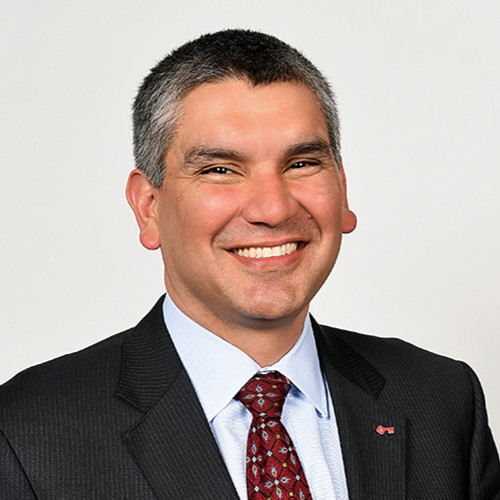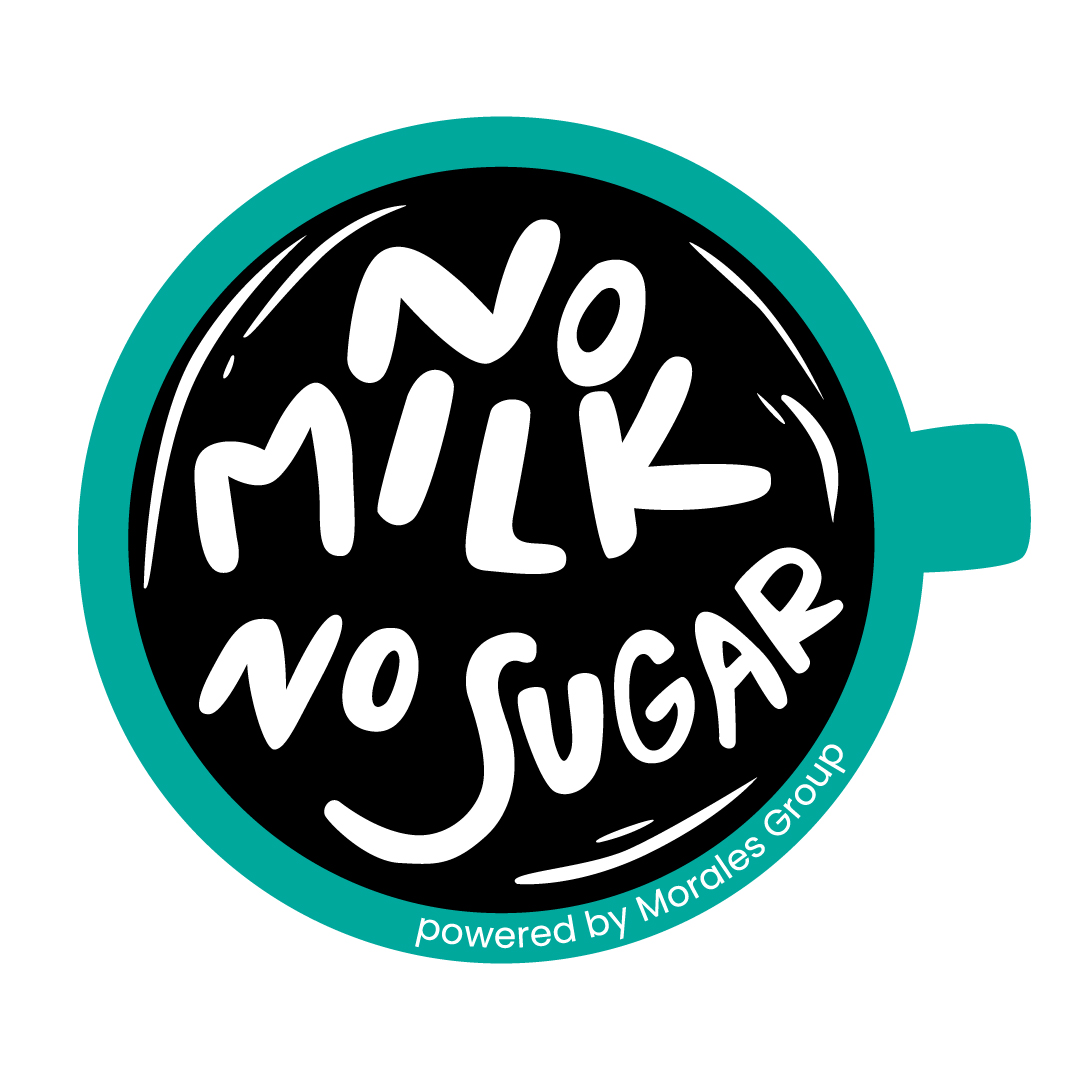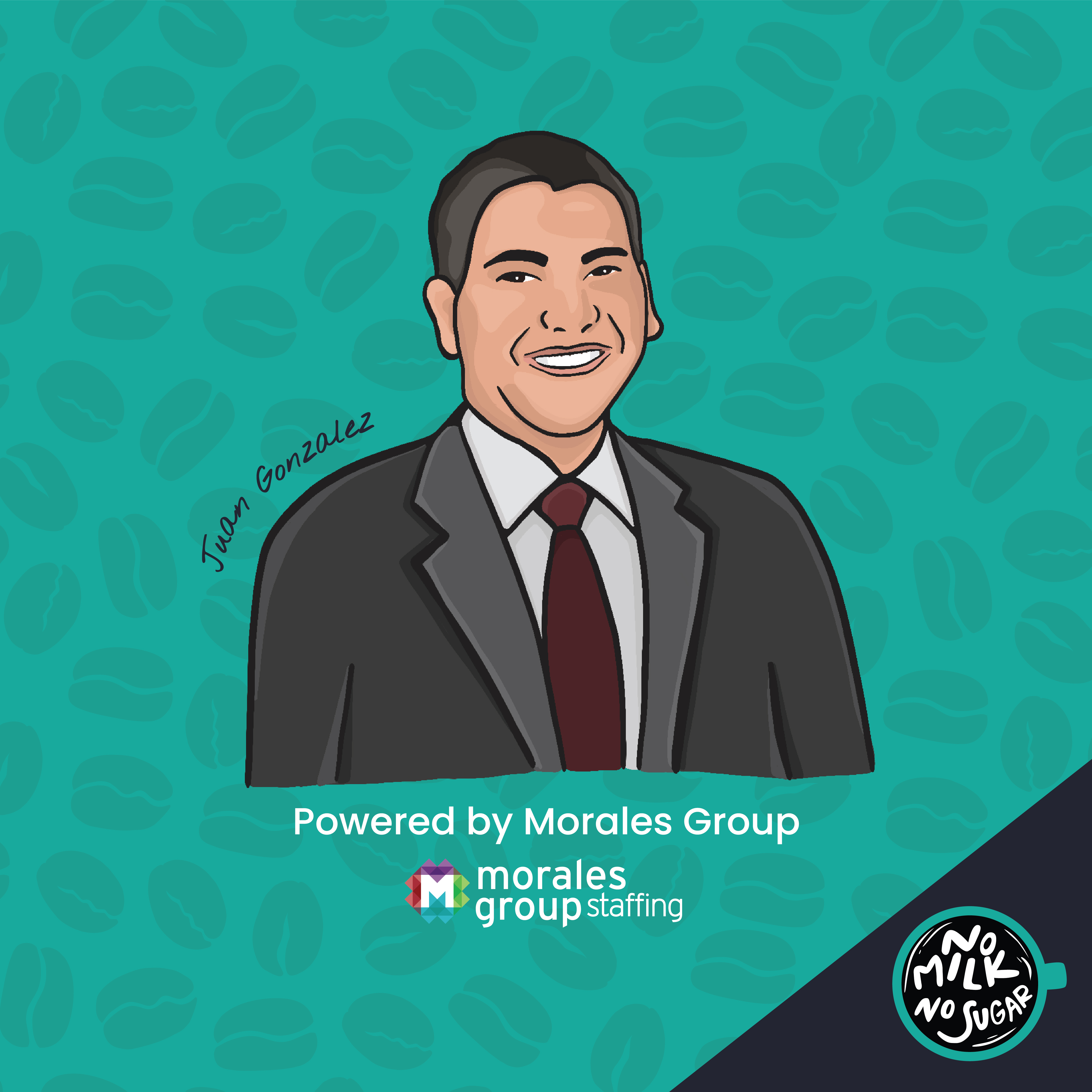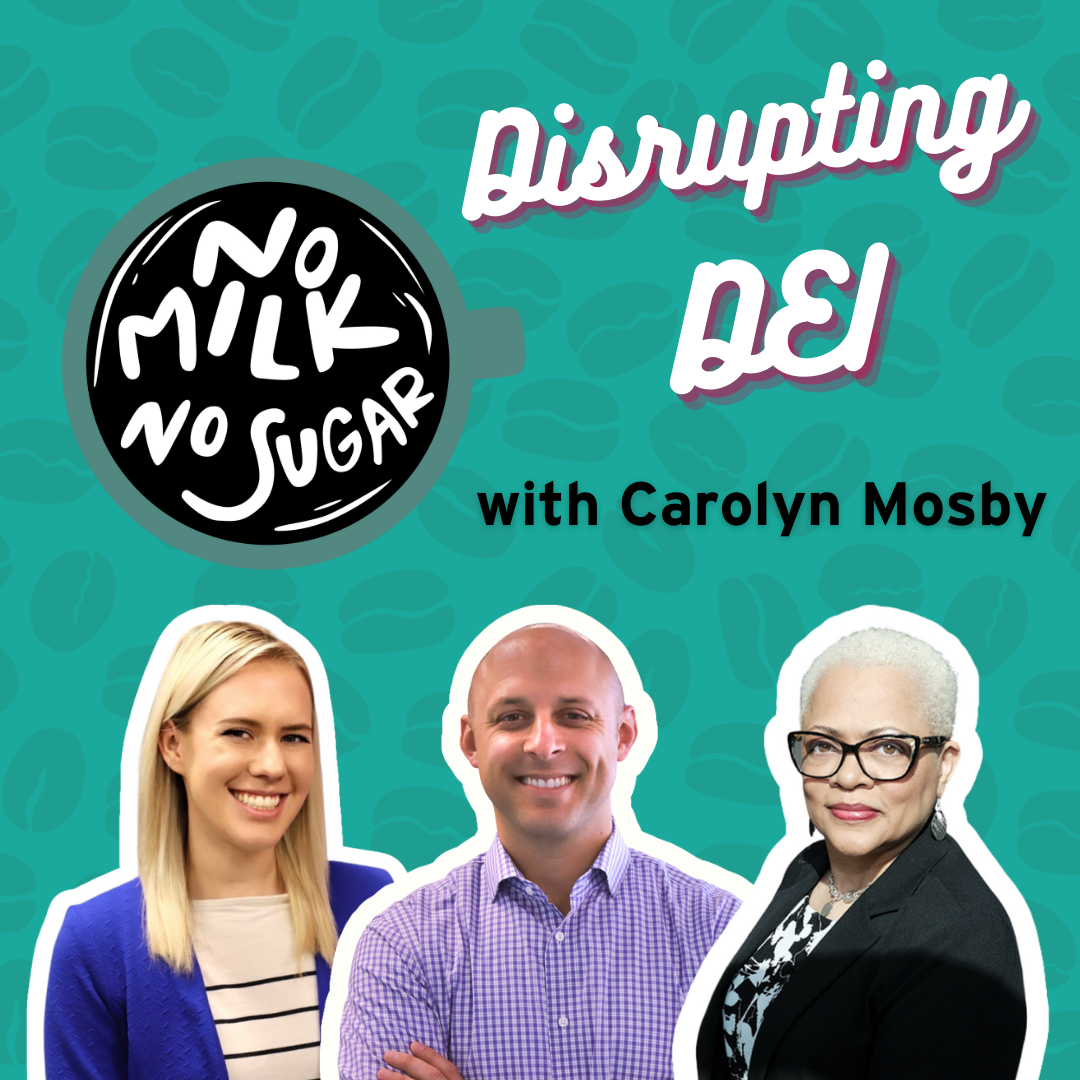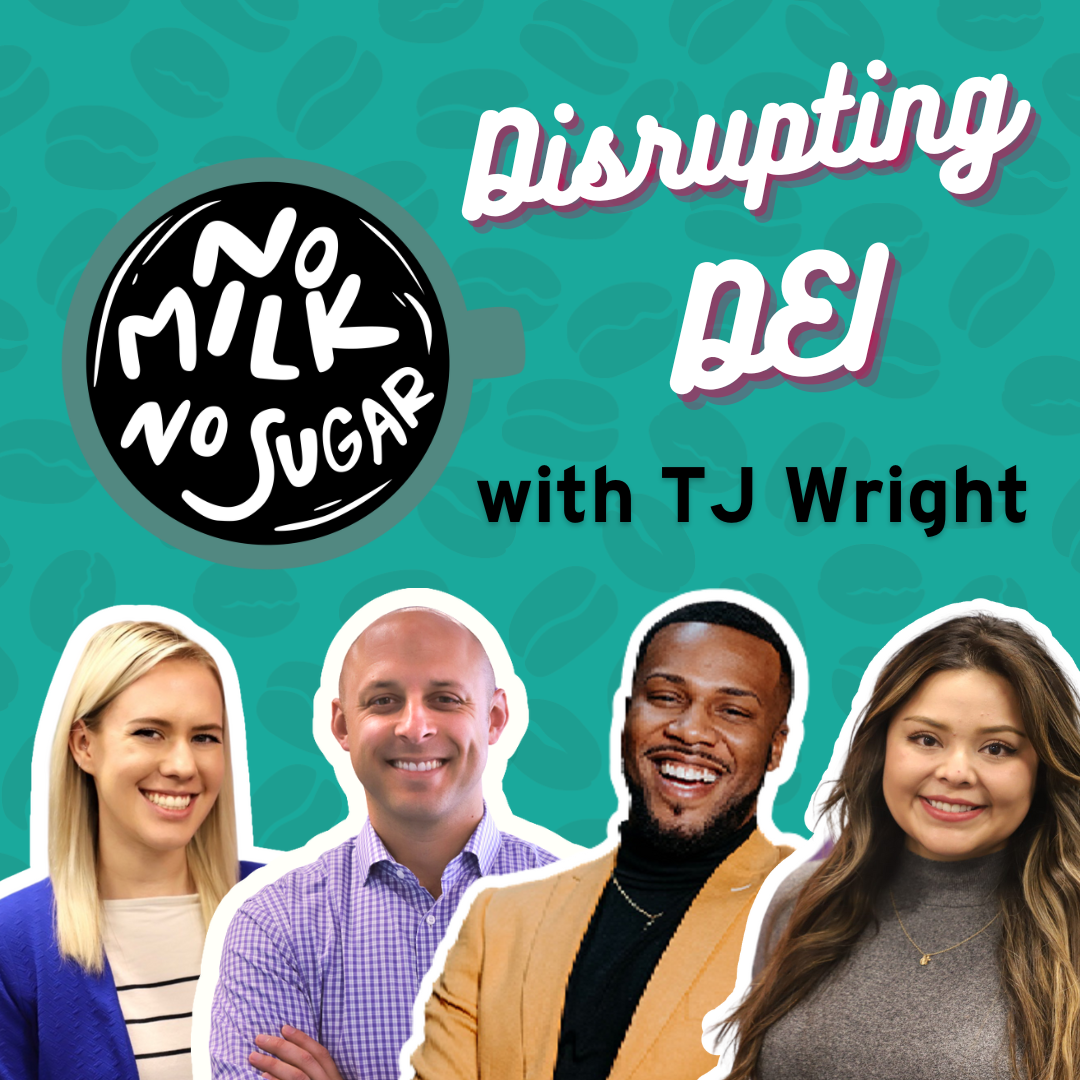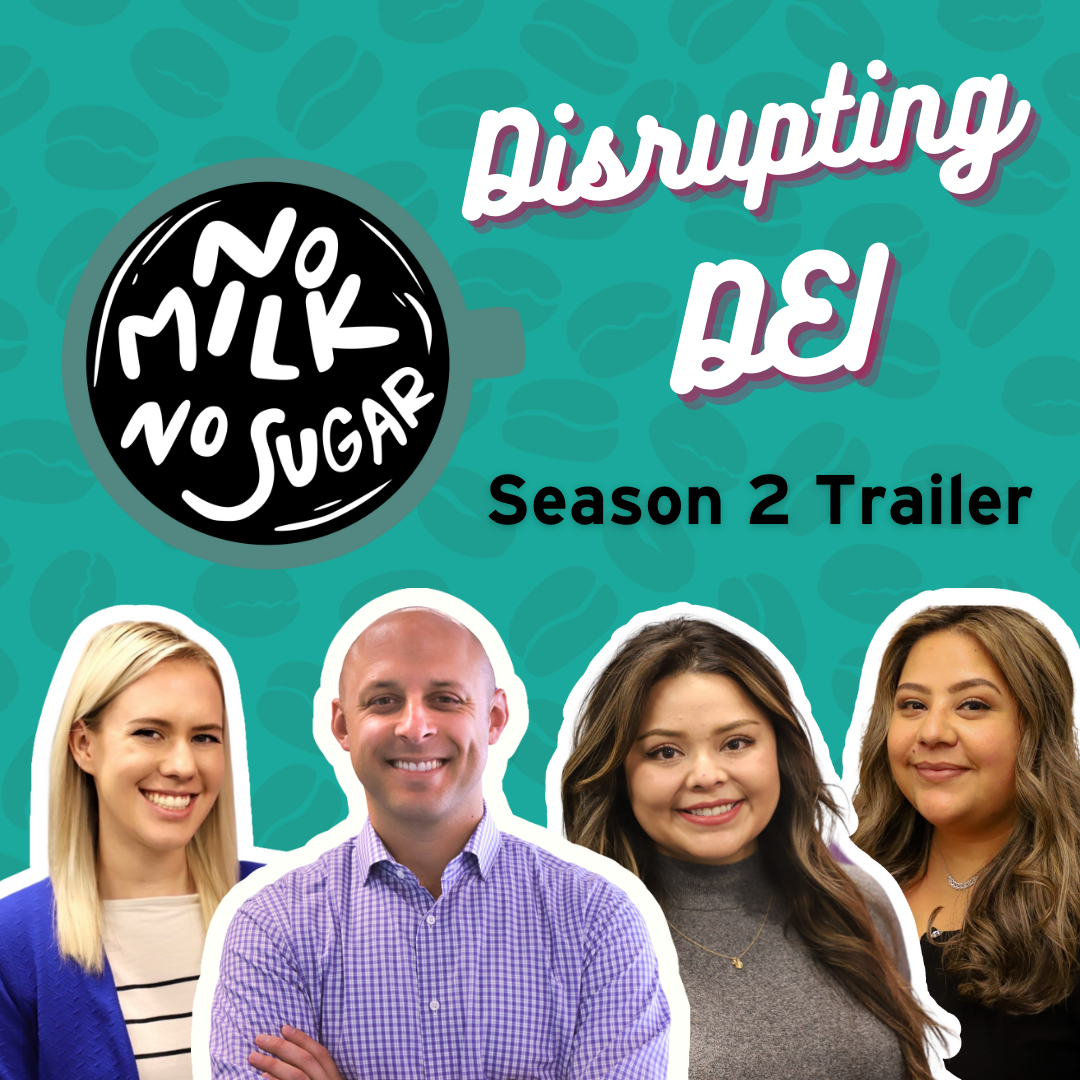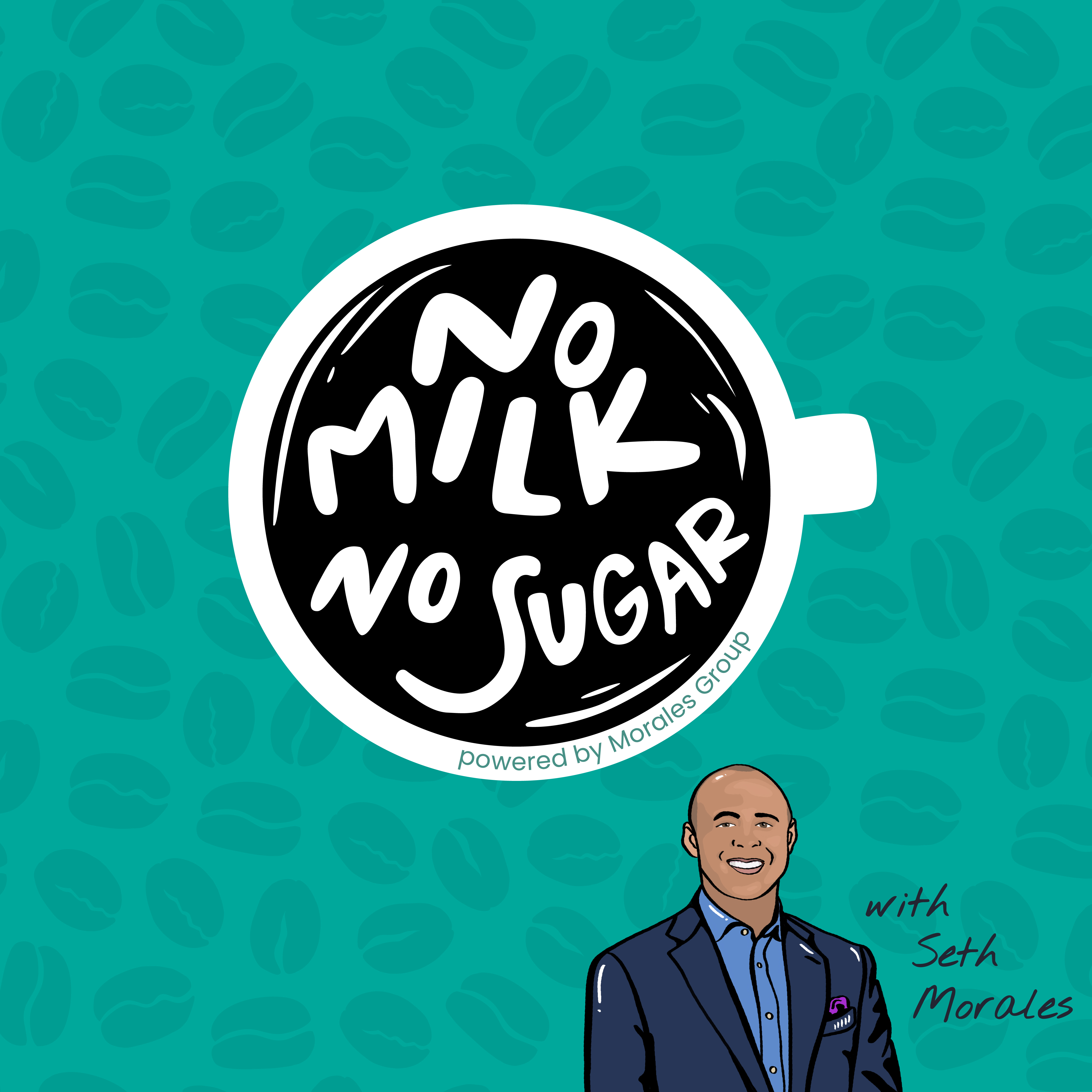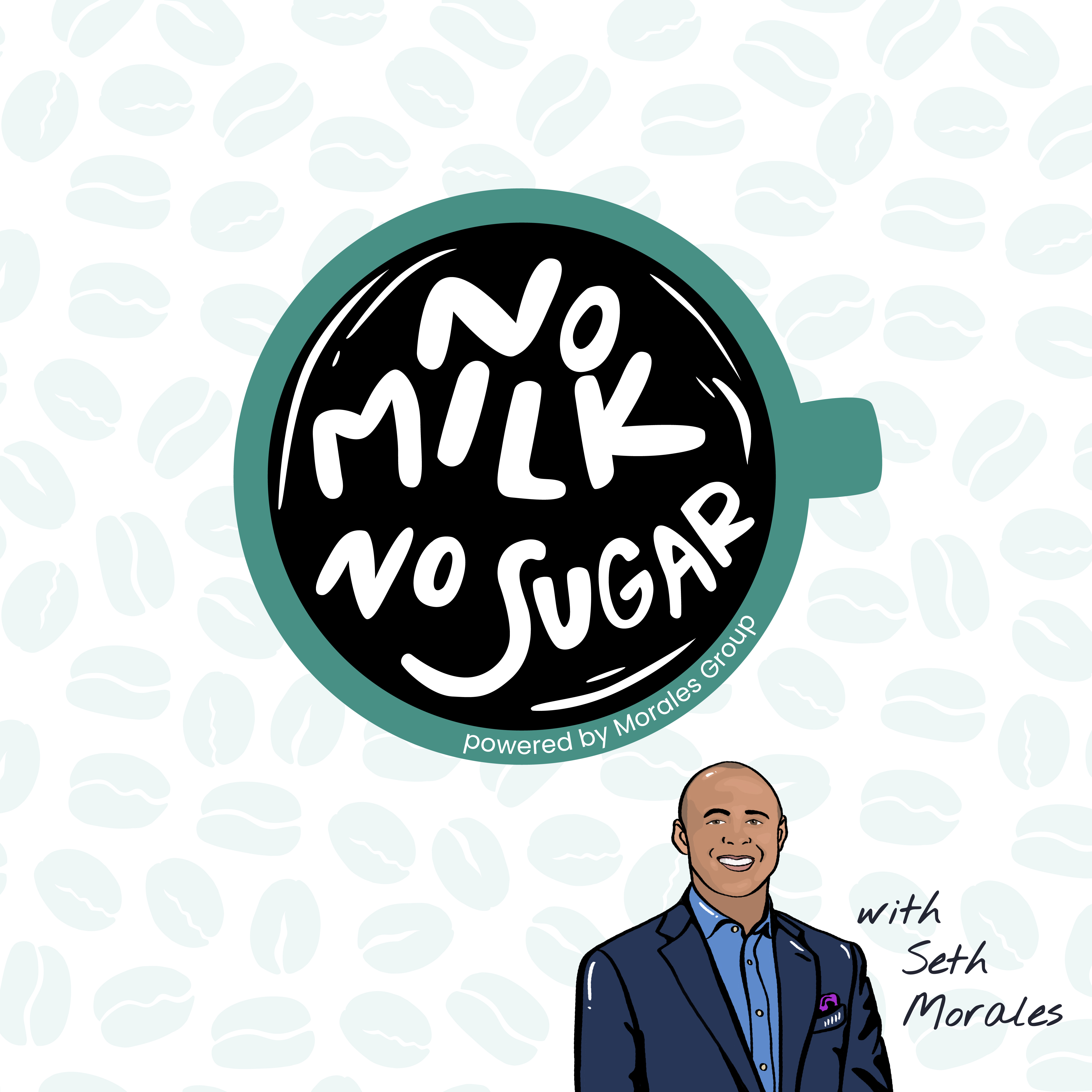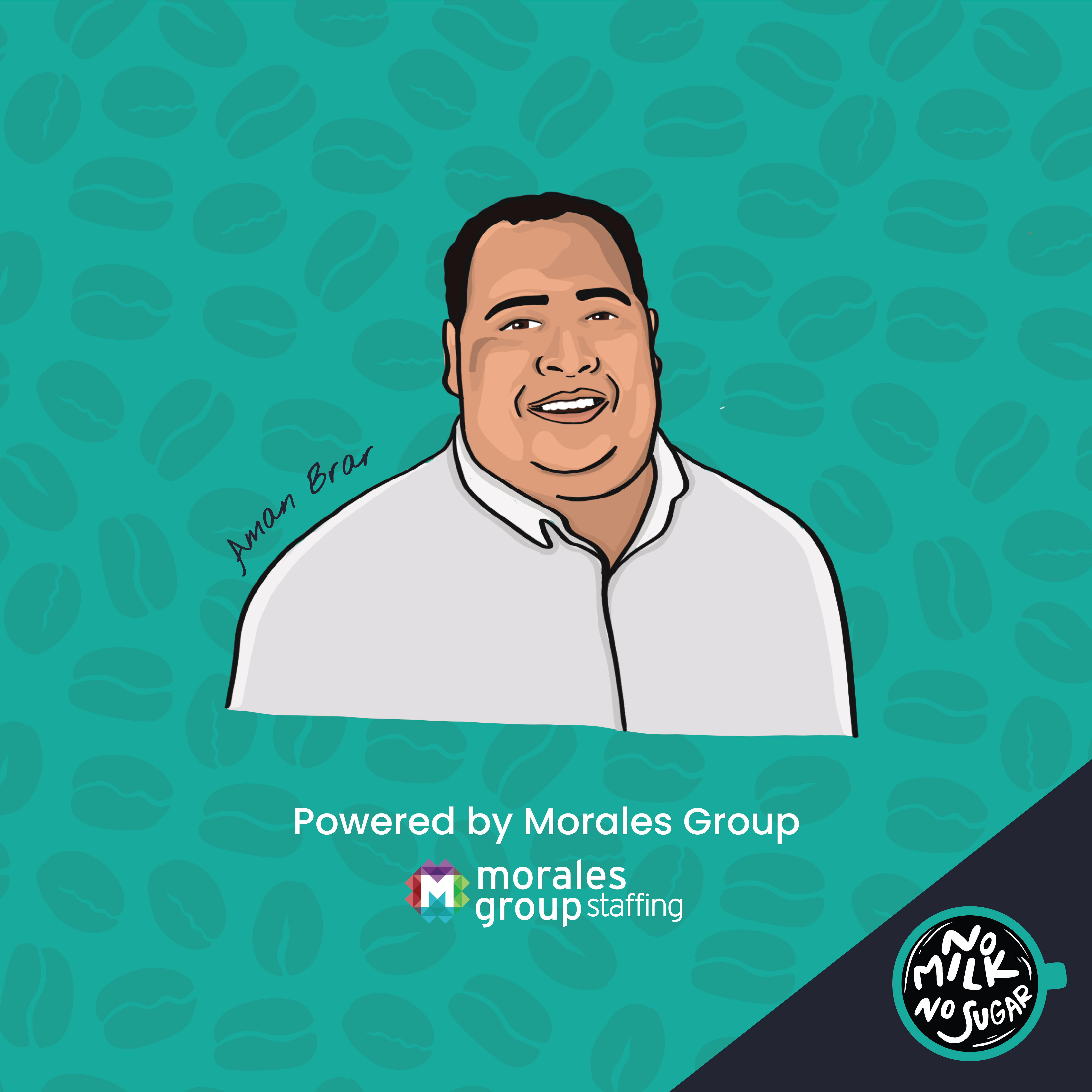What's Really Going On in the Economy, with KeyBank's Juan Gonzalez
- 0.5
- 1
- 1.25
- 1.5
- 1.75
- 2
Tori: You are listening to No Milk, No Sugar, the podcast about business beneath the sweetener. Powered by Morales Group and hosted by CEO Seth Morales, we talk to local movers and shakers about what can be the harsh reality of doing business. We cover what no one likes to advertise, but everyone wants to hear. I'm Tori, producer of this show, and today we talk to Juan Gonzalez, President of KeyBank, Central Indiana, about the state of the 2021 economy, what the future has in store post- COVID, and what this means for business leaders.
Seth Morales: You look good man, you look very stately. Do you have your KeyBank pen on your lapel?
Juan Gonzalez: Always, close to my heart.
Seth Morales: I love it man. Hey, today, I want you to feel like you and I are at Hubbard& Cravens at 49th and Penn or inaudible, grabbing a coffee, you can be yourself. Today, we're going to get into the economy and your role, and just a little bit about what's going on and get some insight from you. You are a busy man, you keep active, networking, you're running the market as the President of KeyBank here in the state of Indiana, so you got some responsibility. Remind me again, I said five boards on LinkedIn, but is it like 10 boards, how many boards are you on?
Juan Gonzalez: Yeah, it's way too many. I think officially, there's seven, but yeah, it's crazy. But look, you know this better than I do, there is nothing better than giving back a little bit of time to help others. I've been very fortunate all my life and my parents were very community driven growing up in Colombia, so it's almost like part of my DNA to give back and help others. Kind of like your dad, I remember when I met your dad for the first time and the dreams that he was forming a company, but also what he was doing with the community already while trying to grow a company, while trying to grow a family, all of you guys, I think you guys are five kids right? And trying to make sure that everyone is going in the right direction, it's just fascinating. So it's something that I'm passionate about. I do tell you something that you know very well which is trying to find that life balance kind of thing, because it takes time away from your family, but you do it the right way, you can combine both, and actually introduce your kids to the same kind of thing that I was introduced when I was a kid. So I'm looking forward to that.
Seth Morales: No, you're doing a great job man, I think as a father of three, is that correct?
Juan Gonzalez: Three, yeah.
Seth Morales: And Sheila, a dynamic partner of yours that is pretty savvy in her own right, she gives you a run for the money. But you've just done a great job of giving back to the community, serving on boards, stepping up as a leader. We're do a little bit of context at the beginning to introduce you on the show, but Butler MBA grad and came over here several years back, but you've really kind of made Indi your new hometown. And you've been in the banking industry for a long time, you were with another bank, then you had this opportunity to jump over and be a leader in this market, which is a really big deal. So today, I thought it'd be awesome just to kind of get some context from you with what's going on right now in the market, in the economy. You see a lot of deals, you understand a lot of different sectors, there's a lot of incentives being tossed out which are good and bad to some people. It's hard to find labor, we're going to get into that later, I got to a couple of questions there. But if you were to give me just a quick like no bullshit, back of the napkin, this is what's going on, for our listeners today, what would you say is going on right now with the market?
Juan Gonzalez: No, I mean I tell you, it's been a great year for the economy. The recovery from the pandemic has been real, I think the vaccines are working very well. Unfortunately, we're still having some issues today with the Delta variant and some people not getting vaccinated, so ideally people get vaccinated in a few months and we can kind of move forward. But economic growth has been incredible, I think they're expecting 6 to 7% growth for the full year, taking in mind that the first six months it was like 9 to 10% and the second half it has kind of normalized more to probably 4 to 5%, but the average for the year, 7% for a country like the United States is incredible. If you think about, if we were to grow 2. 5, 3% every year, that would be someone, because we are a country of 300 million people now. So to think about 7% is just making up so much from last year, and with an economy that is pretty much fully open but not at full steam yet, because the service industry is still dealing with some of the backlog and the issues with labor that we're going to talk about later. But also, inventory and some of the materials, and the issue with computers and cars and all that that we have faced this year, that it was real, and the backlogs at the ports moving material. But I think people should be excited, I'm telling you, the economy is not only good, but the projections are pretty healthy, especially with the infrastructure bill that was passed by the Senate. We're waiting for the House to take action, but ideally they get to an agreement, they get it in front of the President, and that's another trillion dollars of growth that is going to be injected into this economy for many years to come.
Seth Morales: No, that's great to hear. You know when you tossed out that GDP growth number, that's really encouraging. We haven't seen that on our side, we've seen the demand with a lot of need for talent and people, but you're right, there are a lot of different sectors that are really picking up pace. Who would you say is in a good spot right now, if you were to say a couple of verticals or sectors that are doing really well? Anything kind of stick out right now?
Juan Gonzalez: You know, logistics is doing extremely well. And I know that's a big umbrella, but just the term logistics which is basically moving things around, is significant. But I tell you, construction, the construction industry hasn't slowed down to be honest much. And again, labor is an issue, they need more people, but try to build something today is going to take you a while to get somebody to come in and give you not only a bid, but to find the materials to be able to get it going. So you're seeing, on the consumer side and the commercial side, quite a bit of construction going on, despite the fact that we were all afraid of what the real estate market was going to do with people working from home and things like that. At some point we'll feel some of that effect, but so far construction continues to go in the right direction as well.
Seth Morales: What about just you as a leader over a lot of teammates here in the Indiana market, an executive for KeyBank, there's a lot of responsibility in going through what we went through last year with the pandemic, and whether you had customers that were defaulting on loans or getting close, I know there was PPP money? What was the toughest part of your job man, being in your seat, you had a lot of people that you're responsible for, there's a lot of money out there maybe not performing as well, give me some flavor for being in the hot seat as President?
Juan Gonzalez: Yeah, I answer that question two ways. One, the personal side of being a CEO that I know you deal with this daily which is, they're looking at you for guidance, for that kind of like positive attitude, communication messaging. And the first few months were difficult, when nobody knew what was coming up but I needed to make sure that they knew that we were here for them, that the bank was going to be here for them, that we were going to be okay. And that took a tremendous amount of emails, and phone calls, and Zoom calls, we were doing Zoom calls every day of the week almost felt like it, all day multiple teams around the country, and passing that message to the different teams to tell them we were going to be okay. But then the other side is the business side, the clients, having that conversation that hopefully things were going to be okay and that that bank was going to be here for them during the difficult times. And I tell you, PPP, regardless of the politics of PPP, it worked, the first round was incredibly difficult to manage. We made a commitment to the market that we were going to play, and we did, 100% of our clients and more got funding in round one, that was incredible for us to do. Round two was easier in the sense that the volume was lower, but still you needed to make sure that the businesses were getting their money. One thing that people don't talk about on the CARES Act, the approval of the PPP, there was a side to that that was also added which was, for any SBA loan that anyone had, the Federal Government made six months of payments, interest and principal, on behalf of the clients, for free. So people forget that, and then they added more in the second round, so I think some companies ended up getting 11 payments, basically a full year payment for free, they don't have to pay it back, nothing, it was just included. Free meaning for the company of course. Some people will argue that it's taxpayers' money, but again, it was for the good of the economy. So that helped a lot of businesses to stay afloat, not to worry about making their bills, paying their bills, in addition to many programs that were out there to support companies. But I tell you, those conversations were real, and companies didn't know what to do at some point, are we going to have to lay off people, are we going to shut our doors forever, what's coming next? And we were very good at communicating with our clients. I hope everyone did the same, I feel like most banks tried to do that for the most part. But again, like everything else, there were some companies that ended up closing unfortunately for multiple reasons. In our case, we didn't see many default to be honest. We were excepting more hardship if you will than what we actually saw, which is good news. I'm hoping that's the same case for many of the financial institutions out there, because that would be a good sign for the economy. But I tell you, the ones that you see a lot is the restaurants and those type of businesses, that they really got hit harder than others.
Seth Morales: Yeah, I was on a call with Governor Holcomb midpoint of last year, 2020, and he had a bunch of business owners, and Graig Hughes from inaudible, and Jim Dora from the hospitality and hotel industry, and they definitely took a hit, but those guys are great operators and they're recovering and getting bacK to normal. Probably still a challenge to find labor in the service market, I know that I've been in and out of restaurants where I've gone to try to sit in and dine in, and they've closed up the dinning rooms because they can't find labor. But again, I'm hopeful, I agree with you, I think those incentives were needed, I would say that the incentives were timely. Part two, I might have a different viewpoint, I think they were necessary, but at the same time, I'm seeing some of the challenges that we're facing from it. But at the end of the day, it's all about supporting those that were essential to the workforce on the front lines and that's what it's about. We're taking a little bit of a hit on our end from a staffing standpoint, but at the end of the day, we support it. I was going to ask you, remind me again, you've been in banking for how many years?
Juan Gonzalez: In banking, about 18 years now. Yeah, I'm getting old.
Seth Morales: And you've been with a couple of banks, was it Fifth Third prior to this?
Juan Gonzalez: Yeah Fifth Third, and prior to that for a small two years, I was with National City Bank, now P&C. And then at Fifth Third, I was six, seven years there, and then here 11 and a half years now.
Seth Morales: So you have a unique perspective, because you see all these different things, you have a lot of relationships with other competitors, and then you see your overall portfolio, and then KeyBank overall nationally is such a massive bank. Do you think like right now with the economy, we have this kind of one pager that we've been playing in our heads about the freeway, like you're onboarding onto a ramp to get on the freeway and the economy is the freeway, are we on the freeway going 70 or is it taking us some time? You said that we've accelerated, there's a lot of growth, like how you would you consider the current state? We're in a really good spot, we're ramping up, or all this supply chain has us really backed up and we're at 40 miles an hour, getting ready to get on the ramp? What comes to your mind there?
Juan Gonzalez: No, no, that's a funny way to think about it. I will say we're probably around 45, 50 miles an hour right now. The only reason I say that is because we don't have the full supply chain going yet, so you're starting to see some of that backlog taken care of. But you're still seeing in the auto industry for example, they haven't been able to seel new cars because they couldn't get the chips that run the trucks or whatever, so there is a bunch of cars sitting out there somewhere brand new they haven't been able to put into the system yet. Things like that, like computers, it's so hard to buy a computer today. And those are easy things that you will think you will buy for your kids for high school, for elementary school anymore you got to have almost like an iPad. So they can not find them, and you think about the momentum that that will create in the consumer side is significant. You look at the housing market, it's almost impossible to find a house today that doesn't sell in 24 hours. Interest rates are so low that they're allowing people to maybe afford houses today that they couldn't before, and two, maybe you stretch the payments a little more because you're going to have a lower payment with the rates so low. If you look today, they're under 2.5%, 2. 6%, it's crazy what you can get for a mortgage today. But then at the end of the day, I think if you look the politics have changed, and I think the country, I mean there's still a lot of work to do, but I think it's been the last six months a little bit of that energy coming back to hey, now you can plan a little more, you can think about the future, because the system is set up in place for companies to be able to forecast. And that in the last for years, it was getting harder and harder because of the issues with China and with Russia and all that. So I think now, they haven't been resolved by any means, but I think you're seeing an economy where companies are again starting to forecast, hey, where am I going to build a factory, where am I going to go build the next thing? There seems to be a momentum of companies moving some of those jobs back to the United States which will be helpful to get more of those high end jobs here. But two, I believe the infrastructure deal, because those are basic needs that we have as a country, roads, and bridges, and airports, and all of that, that's a 25, 30 year impact that people haven't felt yet. And when we start seeing those medium paying jobs, in the sense of some of them will be six figures, some of them will be upper, closer to the six figure number, which will be permanent jobs for a long time for people around the country. So I'm very optimistic, I tell you. Unless something crazy happens in the next three years in the world, who knows, there are some things you don't control, climate change is an issue that we got a keep an eye on. But as an economy, I think we are at a good level to accelerate and hit your highway that you mentioned at that faster speed, 65, 70, maybe even 75, in 12 months.
Seth Morales: I like the optimism. So 45, 50 right now with a lot of good things on the backend, infrastructure, that's a really good point, thinking about that bill and the impact long term. I'm bullish, I'm optimistic like you, I think that the'20s will be a decade of growth, we kind of go through these cycles every five to 10 years, just like we went through in'08 and'09 with the Great Recession, and who saw the pandemic and the impact, but you whether the storm. And it's been cool just knowing that you've been through a couple of these cycles and you learn a lot from those, you learn a lot about yourself.
Juan Gonzalez: Yeah, Seth, keep in mind that this was a pandemic, so it wasn't an economic crisis per se in the sense of 2007/2008, when there was an issue with the banking industry because of the housing and all of that, that was almost like self made. So there is a big difference between the two, and I think that's why you're seeing that recovery being so much faster than it was back then.
Seth Morales: Yeah, that's a good point, they were probably going 20 for a while on that on- ramp, versus this is a pandemic, it wasn't fundamental to the economy. That makes a lot of sense. I'm curious, just like long term, you're kind of the mayor of Indianapolis man, what would be, just being in your role, your future outlook with Key and just your aspirations for the city? What do you want to do long term in your position, or how do you want to make more of an impact on the city? You've done a lot of great things, but you're just getting started man, so give us a flavor of what's ahead.
Juan Gonzalez: You're so generous with words, so thank you for that Seth. So Key has been great to me man, I've been extremely happy at this place, they've been giving me some great opportunities and a lot of like you like to say, rope to pull, and the sky is the limit, so we have done some great work here locally. I still see myself making an impact here in Indianapolis for a while in this role, because one of the challenges we have in this industry and in many is growing talent, and growing in many ways diverse talent. Look, I've been lucky, I've been fortunate, but I need to pay back, and I've been growing some of that and spending a lot of time at the branches and with employees that are growing their careers and what they want to do next. And just giving them a lot of opportunity, like hey, our Latino employees, what we can do on the Latino community that is different than what you're doing today, besides just being successful with opening accounts and all of that, let's participate in some of the community events and do these things. With the African American, we're doing the same. With the Burmese community, we're starting to get going now, I actually have an exciting meeting with the Director of the Burmese Association to start talking about how do we integrate KeyBank with them in a powerful way. We're doing something with the South Asian community these days, which has been extremely, extremely important for us as a bank, but for the community. You're seeing a tremendous growth of Indian businesses in the community in all levels, healthcare, construction, you name it, hotel industry, all of that. So still, I want to utilize my background to still help continue to grow Indianapolis and Central Indiana to be that melting pot like we should be, and stop talking about race and all of those issues, ideally in my dream, we should be talking about something else. But at the same time in the city, there is some challenges as a city, and safety is one of those that we see on the news every day, and you can tie it back to simple things I would say, maybe not simple. One is education, I think we need to figure out some of the education challenges that we still have as a society in this city, how do we get these kids more opportunity to do more and not just think about what the next CEO of the company is going to be, there is so many opportunities. You run a staffing company, we should be talking all day long about some other jobs that people should be thinking about, that it's not just becoming an athlete or becoming a CEO of a company. God, an electrician, any of those that are so needed today, that people can make a pretty good living on, but the kids have not been exposed to those. So hopefully, we can continue that conversation to help that. But the second part is the issue with drugs and the guns that we're seeing in Indianapolis, the complicated part of that is that it's deeper than just one neighborhood or two and it's connected around the Mid West and all the way throughout the country. So a little bit of work there, it's going to take some effort, but I hope the city does that. And then on the positive side, I hope we start dreaming as a city, that's the challenge I think we have. We don't have these big dreams like Carmel has, or Westfield, or Fishers, and they've done a great job reforming their cities. I mean you look at the city of Carmel 20 years ago from what it is today, it's a whole different place, and it's a beautiful place and it's exciting, and I totally understand why people move there. I live in the city, I love this city, but we're not talking about what are we going to do next, what are we going to do with the inaudible? What is the next big attraction for Indianapolis to bring more families into the city, because there is so much to offer? So I hope we start having that conversation again, but that would be my two cents. I'm not running for mayor, I'm staying in my job for now, I love what I do, but we can influence. So people like you and I and some of our friends that are very involved in the community, we should be pushing this conversation to our elected officials what are you going to do next? I think the Governor tends to have some really big ideas and they have been able to deliver on many of them, and we have benefited certainly from some of those. But I don't think you hear Indianapolis in the mix too much in the last I don't know, five, six, years maybe, when they're talking about some of these regional city monies and where are they going to fund, it seems to be going outside of Indi. We need to part of that mix to make sure that the city, the capital of the state, continues to grow the way it needs to be. Mass transit for sure my friend. I think I'm optimistic on what we're doing there, but we still have a long way to go to attract some of the younger professionals that they don't want to buy a car, they don't want to buy a house, they don't want to drive at all. So we got to be able to provide some of those services for sure.
Seth Morales: I love it man, it's really good kind of overall, holistic outline of what's ahead, what's ahead for you. I love that you're giving back to the community and you're thinking about lifting others up, especially those of color, and lifting other leaders up and thinking about different roles and opportunities. We did a podcast with Ersal and he has some bold visions for this city and why Indianapolis needs to think and become a little bit more aligned with some of those bold thinking visions that he was throwing out. So it's interesting to hear kind of the same parallel as you, he's obviously just an immigrant and came to Purdue University, and his story of building KeyStone construction, which I really just appreciate the bold thinking and getting that same vibe from you. I think it's really fun to talk and mix it up with guys like yourself that not only have a role to lead a business, but you're thinking holistically, it's not just about a bottom line balance sheet and P& L profit. That makes sense, you got to get that right, but you also got to get the community and lifting others up. You talk about education and crime, and you do sound like you are a little bit of a politician, you've got that knack, so if you're ever in that game to make a run, I know some people that can help you. But tell me, tell our listeners just a little bit, you've got an interesting background, you're born and raised in Colombia, when did you come to the US, give us a little bit of flavor? That to me is a fascinating story, and how did you get here, give us some background there.
Juan Gonzalez: Yeah, for sure. So I've been in Indianapolis 22 years now, so I tell people that I'm a Hoosier even though I pronounce it wrong, but it's exciting to say I'm a Hoosier. I grew up in Colombia as you say, I was born in a small town, my dad was an executive at the oil company. And in Colombia there were two cities that had a refinery, and the big refinery was the home town I grew up in by the river, in the middle of the country, a town called Barrancabermeja, which is impossible to pronounce. But it was a town built my Americans, so it looked like a Texas kind of town, ranch style homes, brick homes, no basement, that kind of stuff. But it was a great uprising if you will, because in many ways we had access to so many opportunities to grow in a country that had so much to offer, at the same time that at some point we were exposed to some of the social issues that Colombia had, including the issues with drug cartels, and guerrillas, and things like that, where we learned to be careful with kidnappings and places that you could go and places that you couldn't go. I had an uncle in politics, so I also was exposed to some of those things. So it was fascinating growing up, exposed to so many things, with always having my mom and dad giving back. That was like, since we were little kids, we were going to people that were less fortunate than we were to have meals, and to help them, and if we could help them with a job, my dad was able to help a lot of families with that. Which is priceless, because you do it because you want to do it, but people are so grateful to those little things that we take for granted sometimes. So that was perfect for me growing up. Then I went to school in Bogota to a university called Universidad de los Andes, so I went from this small town to this big city, massive city, it's the capital of Colombia. At the time, it might've been 8, 9 million people, busy traffic, you name it, it's like moving to New York when you're 17. So I got there, I did six months of my, I studied economics, and then when I finished my first semester I was still 17, so I came to be an exchange student, because you had to leave before you were 18. And I went to a city called Amarillo, Texas and lived with an American family for 11 months, and that was awesome, two brothers and a sister and they were like 10, 8, and 6. So I was throwing into the ringer, part of the family, doing duties, all of this stuff that you probably grew up doing that I wasn't doing much of, and it was so fun. And the first time I saw snow because I'd never seen it, it's northern Texas, so there's a little bit of winter sometimes, so that was so fun to watch. And then went back to finish my undergrad, worked for my family business for a couple of years in the TV industry believe it or not, running a TV show which is crazy that they let me do that, but that was fun. And then I always wanted to come to the United States to do a Masters, with the goal of going back to Colombia, because that was important to have a Masters from an American university. And I was going to get back into politics, I was going to like get with my uncle and get back into that, I always had that little dog in my ear. But as luck goes, I come here, well IU, believe it or not, IU Bloomington recruited from the university I went to for their international program, for the Masters and all that, so I was supposed to go to IU Bloomington for six months of English before I started my MBA. But my older brother, I'm one of three brothers, my older brother was in St Louis, Missouri, and he met a family from Indianapolis that didn't have kids and they wanted the experience of having an exchange student living in their house. So we talked over the phone and it made sense, we knew Indianapolis because of the 500, so the connection with the 500 is kind of crazy. So I came to Indianapolis to live with them, and went for six months of English at what used to me Marian College, now Marian University, that's where the English as a second language school used to be. Applied for my MBA, and I looked at four schools, IU, Michigan State, University of Chicago, and Butler, because somebody said you got to talk to Butler, and all I wanted was an internationally accredited school that I could go back home with that degree. So Butler was private but for me, it was 50% cheaper than the other ones, because I didn't have to pay out of state tuition or international student tuition. So I didn't have access to student loans, so Butler was the choice. So I stayed in Butler in Indianapolis as life goes, and then two years later, I'm graduating. I did a semester here, working for JP Morgan Chase, at the time it was Bank One, as one of those internships that they do. They wanted an MBA student, so I was selected for it, so that's how I got into banking in this town. And then graduated, and a friend from the MBA that you know, Nolan Smith, was working at National City Bank, he was the first recruit from Butler if you will from South Africa, that they sponsored. So Nolan is like, hey man, you want to come over here, and I went to work for them, and the rest is history. Colombia was going through a little turmoil, so nothing happens here believe it or not, so life was good, and here I am 22 years later.
Seth Morales: That's wild man. I didn't know that Nolan was part of that common connection with Butler. And I knew you did the MBA program and I knew there was a little bit of a, you knew my uncle many years ago when you first moved in, so this was early 2000? Okay.
Juan Gonzalez: 2000, yeah. I lived at the United Nations House on 32nd and Washington, if you remember that house.
Seth Morales: Yeah, I do man.
Juan Gonzalez: It was people from all over the world living there, including myself.
Seth Morales: Yeah, no that's neat man. We're fortunate to have you man, and I think you're doing some phenomenal stuff. We talked a little bit about the economy today and how we're ramping back up and getting back in full speed, you talked about Indianapolis and the future, and some of the dynamics around what we can work on and what's working well, and I appreciate you sharing some of the background. You've done a really good job, I just think about your role as a leader and this podcast No Milk, No Sugar, and kind of cutting through the highlight film and getting to the nitty gritty, can you think of a moment in your life where man, you just like, you totally dropped the ball, fumbled, you made a mistake that this is a key moment, maybe it's been in the last year with COVID or the pandemic? Can you give our listeners just kind of a flavor for hey, here's an example of being in the President role?
Juan Gonzalez: So you said earlier in the podcast that I manage Indiana for inaudible business, and I do, and I think one of my regrets Seth is that because of COVID, we couldn't travel. I wish I would've gone up north to South Bend a few more times throughout the process, not because I needed to be a renegade and be in my car by myself and take a break from being home, but more because I don't think I was supporting my team up north the same way. And I ended up losing a person this year, that he got opportunity for another community bank to go, and it wasn't money, it wasn't anything like that, he was just exhausted. I take blame on a portion of that big time, because as much as I thought I was supporting him, I wasn't there for him. And in many ways, I totally get it now that he was on an island by himself, trying to deal with PPP, and life, and his daughter was having a kid, all of this stuff that is going on in our lives, and he didn't have kind of like that support network that we have here because I have family and friends, and coworkers in Indianapolis. So that to me, if I learned anything man, it's sometimes we take things for granted. We tell ourselves, oh, you talk to him all the time, or whatever the issue, we're doing a great job, you got to be there. You got to show up, and you got to look him in the eyes or look here in the eyes, and have this conversation in person sometimes. And I should've taken more risk, because we could've done it without being silly, you could've sat outside in a park, you could've done whatever, wearing a mask, all of that, even during COVID. So I do regret not doing more out there. I took it for granted, I stayed here mostly like many people, worked from my basement which it is what it is. But being out there for people, when you lead a team, you got to be a leader for everyone, not just for a few. And that was a hard thing to swallow. But I wish him the best, I know he's doing well, we remain friends. But as a leader, people usually leave you the leader, not the company, and I know, I know I failed him. I tell you man, that was a hard one, I never thought he was going to leave, and here we are talking about it, because it was a great learning experience for me as well.
Seth Morales: Thanks for being authentic man, that's not easy to own up to. And that's a good learning moment for me, because I've been kind of remote, a lot of it's been virtual, and I haven't been out to the offices like I should with our different branches, whether it's in Louisville or Dallas, or their surrounding state. That's a good lesson for all leaders I think. There's this article that came out the other day, and I think it was the Journal or the Times, about this great resignation and how there's a lot of talent moving around, and they're burnt out from last year. I'm actually writing an article along with Tori, she's helping me kind of co- create this article in the IBJ about this idea of, we've got to re- recruit our team, we've got to find a way to re- engage and build that engagement back. Whether it's doing the fundamental things or being creative about it, you got to do both, and there's a lot of I think talent right now kind of looking around for what's ahead. So good thought there man, I really appreciate that. That's actually a good nugget of wisdom for us all, you got a really cool just like international background, and your banking history, and being a community leader and all the boards that you serve on. Speaking of you, talking about the Indi 500, you're on the Indi 500 board and you have that pace car every summer, I see you looking really good with the Camaro and the top down. So one of these days, you got to give me a ride and let me experience what it's like to be... what is it, the 500 Festival, what do you guys call it?
Juan Gonzalez: It is yeah, the 500 Festival Board. So that's the organization that is in charge of the parade and some educational programs, and the Princess Program and all of that. Yeah, that is a fun two months. And what a dream come through, I used to watch the race every year on a Sunday from Colombia, never thought I was going to be living in Indianapolis, never thought I was going to be driving a pace car.
Seth Morales: That is a very cool story man. Again man, thanks for sharing, we're really fortunate to have you on the show. Keep crushing it and growing, doing what you're doing, you're having a ton of success, and I've just admired you from a far. It's been fun to watch and take notes, and thanks again for making time.
Juan Gonzalez: Thank you Seth, and thank you for doing this. Anytime my friend, keep doing the great work that you're doing and I'll see you around for sure soon.
Seth Morales: Sound good man, thank you.
Juan Gonzalez: All right, see you later.
Seth Morales: Why don't you kick off? Give me something, come on Tori.
Tori: One of the things that, well one that I just thought was very sweet was how he talked about being very excited to be a Hoosier and having that impact on the community, especially coming from his background in Colombia.
Seth Morales: Yeah, he's very much part of the community and he's a inaudible kind of Hoosier, so you got to appreciate that. Very similar to Ersal, just like with loving this city, wanting to give back, and not being from the home town, we need more folks like that. That's why I'm a little bit pro- immigration, you want to get folks that are entrepreneurial minded that want to give back and build, and just do better for the overall community. So I like that. Another thing that really stuck out to me, and we're talking a little bit about the economy, he said hey listen, we're not full speed, 70% on the freeway, we're 45 to 50%, there's some really good fundamental things going on, that was encouraging. There's obviously some things that aren't great right now, like trying to find talent and hire, and it was encouraging to hear, here's his state, it's really healthy, economy is growing, we're going to be at 70 miles an hour buzzing down the highway in a short period of time, so that was good to hear.
Tori: I know, that was really interesting to kind of hear the scope of the economy from someone with his perspective. Have you noticed in your role as President and CEO, have you noticed any of the changes that he was talking about, or anything coming down the line?
Seth Morales: I think being in the service industry, we haven't seen it as if we're like a tech company or we're in fulfillment, and everyone was ordering online and there's a lot of growth that way, or in construction. We haven't seen that, I feel like we're a little bit lumped into that service industry. I wouldn't say we're hotel, hospitality and restaurants, I think they got hit really, really hard, I think we're kind of a little bit ahead of them. But I don't know, I feel it buzzing back up. We'll see, I think the back half of this year get a little bit hotter with like demand and orders, we have demand, it's just hard to find the supply. So I think the supply is just trying to catch up and it takes a little bit of time.
Tori: Well, talking about, I know you always like to ask the question of tell us about a time where you had a swing and a miss, what did you think about that story?
Seth Morales: It was wonderful. I think it was spot on, it was probably one of the better oh shit moments. He realized he left one of his leaders behind, and he got comfortable in kind of a virtual remote work mode and he didn't make the time to go see that other leader up in Northern Indiana, and he regrets that. And man, it's not easy when talent leaves like that. So I appreciated him being vulnerable, and I think it was a good lesson for us all, because we can get really kind of status quo with how we lead people, so a good reminder.
Tori: It also reminded me of, I think that's just a good takeaway that we've seen from several of our guests, like including Kristin Corbitt, and how she was talking about with her succession planning and how she wish she had done that a little bit better, because they kind of left their CEO a little out to dry and that kind of plan. So I think it's always interesting to hear about making sure that you're always connecting with your people and knowing where they want to go and grow down the line.
Seth Morales: Yeah, it's really interesting, I think we could probably take nuggets from all the guests of like, I think Scott Moorehead said that don't hire just based on the resume, or Ersal was talking about culture and values really matter, not having a great resume early on, is what he was kind of hook, line, and sinker, he was catching a lot of talent that way. So I think there's probably going to be some themes that we pull out and one is kind of a similar theme about just doing the fundamentals right, like making time and getting uncomfortable. The other thing that I really enjoyed hearing him say is, I asked him about being a market leader for a bank, and automatically he kind of went into the community and lifting others up, and this whole idea of what happened in the summer with racial reconciliation and just the racial injustices. And he talked about hey, this is not just a moment, this is a movement, and he wanted to find better ways to be an advocate for other folks of minority backgrounds. I like that about Juan, because that's what he does, he's all about trying to get people to step up, and I've been a little bit behind Juan as a leader and it's been fun to see him lead the way, and then I try to emulate some of the things that I like. I think he's just continuing to do good for the city and grateful for that.
Tori: Would you think, I mean just goes to show like, progress is slow but it chugs forward and it is interesting to see this real life impact of over the past couple of decades, we've had so many more minority professionals take leadership positions, and we're kind of seeing those effects of it now, and I'm interested to see how that continues in the future. Thanks for tuning into another episode of No Milk, No Sugar, the podcast about business beneath the sweetener. We hope you learned something, and we'd love to hear from you. Tag us with# nomilknosugar, or email us at nomilknosugarpod @ gmail. com, or connect with Seth on LinkedIn, subscribe wherever you get your podcasts, and we'll see you next time.
DESCRIPTION
Who better than a bank president to give us real talk about the state of the economy? The economy is a car on the freeway, and we want to know how (and when) we ramp up to a safe 70mph. Seth talks to the president of KeyBank Central Indiana, Juan Gonzalez, to dig into what leaders can realistically expect from the economy post-COVID. Listen to learn what this means for business. Seth and Juan also talk the cultural future of Indianapolis and compare notes about how effective minority leadership pays off for community-wide inclusivity.
Today's Host
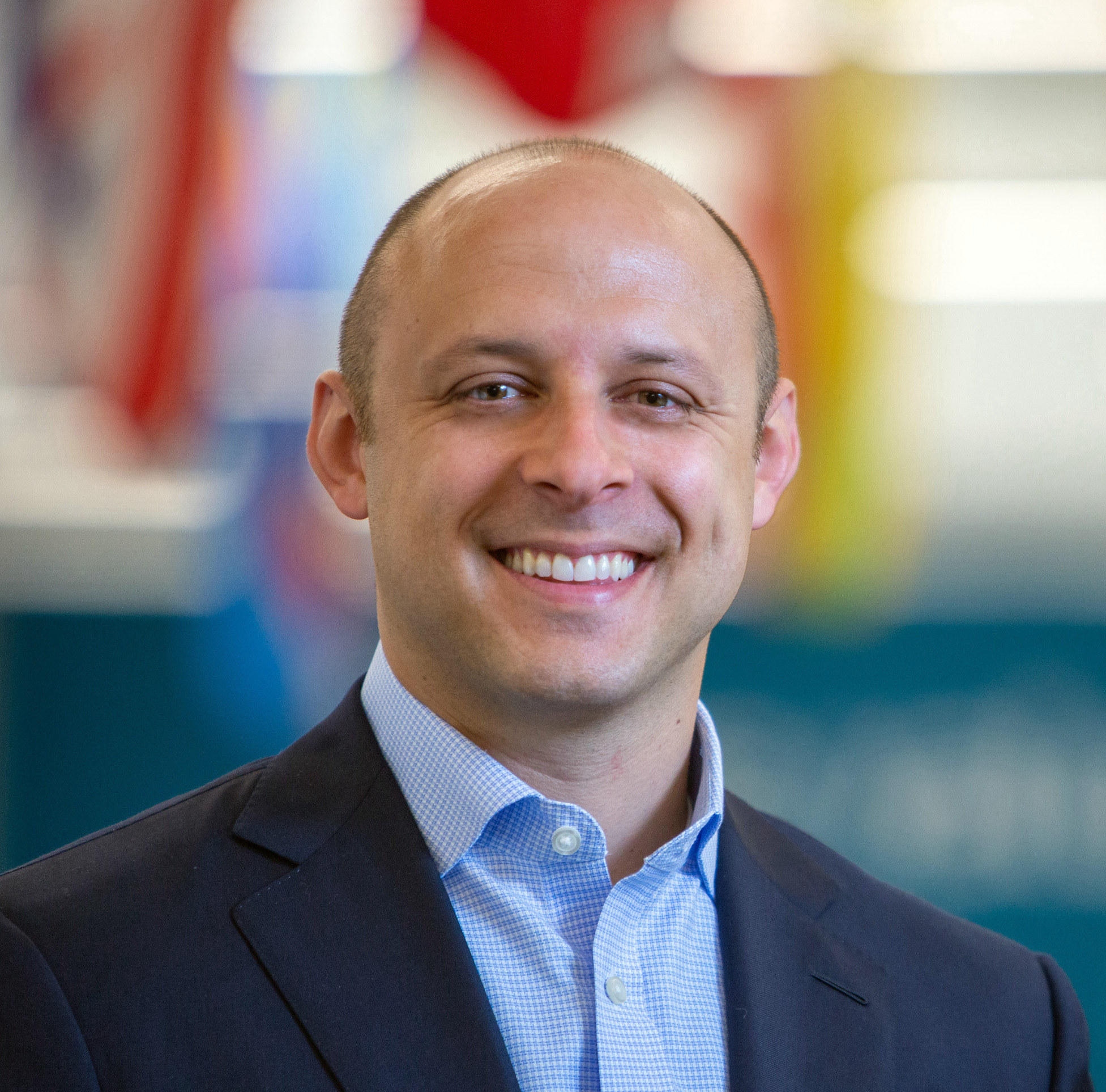
Seth Morales
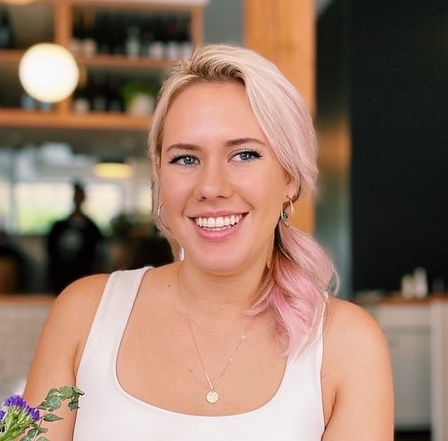
Tori Updike
Today's Guests
